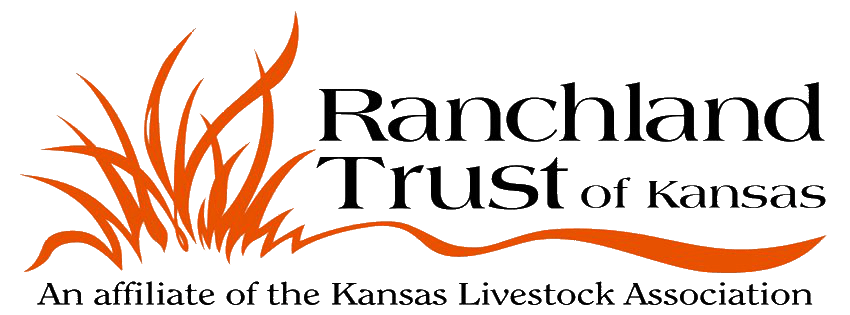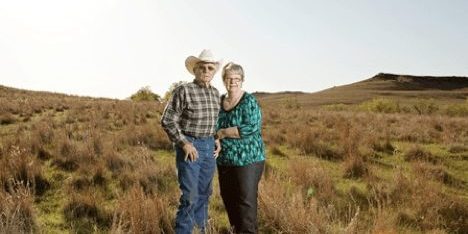VOLUNTARY CONSERVATION EASEMENTS CONSERVE NEARLY 1,400 ACRES NEAR SALINA
The Lindquist Family of Brookville has granted two conservation easements to the Ranchland Trust of Kansas (RTK), protecting nearly 1,400 acres of land in central Kansas. RTK is an agricultural land trust affiliate of the Kansas Livestock Association, with a mission to preserve Kansas’ ranching heritage and open spaces for future generations through the conservation of working landscapes.
“By placing the land in a conservation easement, our family is allowing future generations to see the land as it is today, and perhaps in even better condition,” says landowner Jon Lindquist, who grew up in the area.
The Lindquist family conservation easements closed March 2, 2012, and will protect 1,394 acres in western Saline County from subdivision and commercial and residential development. The easements were granted by three generations of the Lindquist family, including Jon and Kaye Lindquist, Jon’s mother, E. May “Pat” Lindquist, and Jon and Kaye’s son and daughter-in-law, Brandon and Pamela Lindquist.
The properties are located along scenic Brookville Road between I-70 and Brookville. The easements consist of large tracts of unbroken native grasslands, farmland and hay meadows. Rolling topography and large ponds make these properties highly scenic, and greater prairie-chicken and other grassland dependent birds are abundant in the area. The conservation easements ensure that the land will never be developed and will remain available for agricultural production.
“Everyone loves to see the open prairie between I-70 and Brookville, and we are glad to be around to help families protect it,” says Stephanie Manes, RTK Smoky Hills Coordinator.
The Lindquist Family donated a portion of the appraised value of the development rights for the farmland, but the remainder was purchased with funds from USDA’s Natural Resources Conservation Service Farm and Ranch Land Protection Program (FRPP) and RTK’s partner, EDP Renewables North America (EDPR). EDPR’s involvement is related to its commitment to voluntarily offset any potential impacts to grassland and wildlife on behalf of its Meridian Way Wind Farm in Cloud County. This partnership is the first of its kind in the nation.
A 2003 study commissioned by EDPR suggested there could be possible negative impacts to declining grassland species such as greater prairie-chickens from the habitat fragmentation caused by roads, power lines and wind turbines to be constructed near Concordia. This led to the 2008 conservation partnership between RTK, EDPR and The Nature Conservancy (TNC) in Kansas, with the objective of mitigating such potential impacts. RTK is responsible for purchasing and holding conservation easements on at least 13,100 acres of native rangeland and coordinating habitat improvement on 20,100 acres.
“We are pleased at the continued success of our partnership with RTK and TNC,” says Christina Calabrese, EDPR Environmental Manager. “RTK’s remarkable efforts on these two conservation easements granted by the Lindquist family bring EDPR closer to achieving the goals of our conservation project.”
The Lindquists learned about the opportunity for a conservation easement from neighbors, Glenn and Barbara Walker, who granted a conservation easement to RTK in 2010.
“Together, nearly 4,000 acres of native grasslands are now protected from subdivision and development for future generations to use and enjoy,” Manes says. “To RTK, that’s making a real difference.”
A conservation easement is a voluntary legal agreement, between a landowner and a land trust, which limits certain types of commercial, residential and industrial development to their private property. The agreement will stay with the land, regardless of any ownership changes, providing permanent protection of the property’s conservation values. Because of the long term public benefits of conservation easements, such as agricultural production, open space, wildlife habitat, and air and water quality, USDA often provides matching funds for conservation easements, and the Internal Revenue Service offers tax incentives for full or partial conservation easement donations, especially for farmers and ranchers.
“The conservation easements help protect the land for livestock production and wildlife, and keeps the scenic appeal for generations to come,” Jon says.
Landowners who would like more information about conservation easements in Kansas are encouraged to contact RTK at (785) 273-5115 or visit ranchlandtrustofkansas.org.
– END –
FOR IMMEDIATE RELEASE: March 21, 2012
Contact: Nichole Gouldie at (785)-213-0967 or nichole@kla.org

